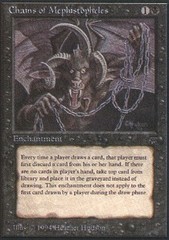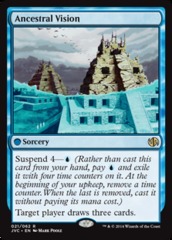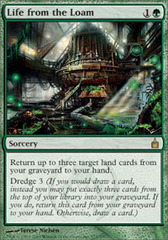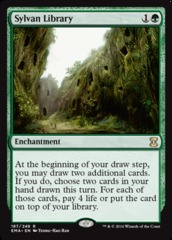Max Kahn: Chain of Nightmares
As I was preparing to head judge the most recent Legacy Nerd Rage Championship Trial, a few things were going through my mind:
- I’ve judged a bunch of Legacy events.
- Legacy really isn’t as complex as people make it out to be.
- Chains of Mephistopheles isn’t a “real Magic card.”
Unluckily for me, the latter two weren’t true for this event.
Whenever people ask what the “hardest judge call ever” would be, it would most likely involve Chains of Mephistopheles. Most situations involving this card from Legends — printed before I was born — usually are just shrugged off, because Chains of Mephistopheles is a fringe card in Legacy. I certainly didn’t anticipate that a situation come up involving this card. But alas, here I am writing an entire article about a single turn in a single game.
Before we begin, let’s set the scene. The cards involved are:
- If a player would draw a card except the first one he or she draws in his or her draw step each turn, that player discards a card instead. If the player discards a card this way, he or she draws a card. If the player doesn’t discard a card this way, he or she puts the top card of his or her library into his or her graveyard.
- Suspend 4—Blue (Rather than cast this card from your hand, pay Blue and exile it with four time counters on it. At the beginning of your upkeep, remove a time counter. When the last is removed, cast it without paying its mana cost.) Target player draws three cards.
- Return up to three target land cards from your graveyard to your hand. Dredge 3 (If you would draw a card, instead you may put exactly three cards from the top of your library into your graveyard. If you do, return this card from your graveyard to your hand. Otherwise, draw a card.)
- At the beginning of your draw step, you may draw two additional cards. If you do, choose two cards in your hand drawn this turn. For each of those cards, pay 4 life or put the card on top of your library.
I’ll also familiarize you with the concept of replacement effects. A replacement effect will usually be written on a Magic card using the word “instead.” Replacement effects don’t work like triggers, because they can’t be responded to, can’t be forgotten (like Missed Triggers) and multiple effects can apply at once. If multiple replacement effects would modify something, the player being affected by those effects can choose which one applies. In this case, the player who would draw the card can choose which replacement effect applies: Chains of Mephistopheles or Dredge, since both are replacing the same action (drawing a card).
Let’s set the scene. Anthony (Editor’s Note: All names have been changed to protect the guilty.) is playing a Shardless Sultai deck against Natasha, who is playing a Punishing Jund List. Anthony controls a Sylvan Library and has a suspended Ancestral Vision with one time counter on it. Anthony also has a Life from the Loam (among other cards, including lands) in his graveyard and a Jace, the Mind Sculptor as the only card in his hand. Natasha controls a Chains of Mephistopheles.
So, the moment you’ve all been waiting for. How does this play out?
As Anthony’s turn begins, Ancestral Vision’s suspend trigger resolves and Ancestral Vision is cast. As the player being affected by two replacement effects, Chains and Dredge, Anthony chooses which replacement effect applies. It’s also important to consider Rule 614.11a:
“If an effect replaces a draw within a sequence of card draws, all actions required by the replacement are completed, if possible, before resuming the sequence.”
In this scenario, Anthony chose not to Dredge his Life from the Loam back for any of the three cards drawn from Ancestral Vision. Because of this, the replacement effect of Chains of Mephistopheles applied for each of the three cards drawn. Therefore, Ancestral Vision resolved, and Anthony discarded the Jace and drew a card (Card A), discarded Card A and drew a second (Card B), then discarded Card B and drew a third card (Card C). Due to Sylvan Library’s odd restriction, the identity of Card C had to be seen and noted by a judge (more on this later).
Phew. Made it out of the upkeep with not too much hassle. Now we move to the draw step. Sylvan Library’s triggered ability would go onto the stack during the draw step, but not before the card normally drawn for turn is drawn. Since this card would be “first one he or she draws in his or her draw step each turn”, the replacement effect by Chains doesn’t apply here, so there is only one replacement effect that could replace the card draw: Life from the Loam. Anthony chooses not to replace his draw with Dredge, so a card (Card D) is drawn into his hand (and is again noted by the judge).
Now that the card is drawn for turn, triggered abilities that go onto the stack during the draw step are put onto the stack. Sylvan Library’s trigger resolves, and upon resolution Anthony gets to choose whether or not he wants to use the ability. He does. Now, we’ve got two more draws on the way, and each one has two possible replacement effects that modify them: Chains (since these are no longer the first cards drawn during draw step) and Life from the Loam.
With the first draw, Anthony chooses Life from the Loam to replace it. So, Anthony mills the top three cards of his library and returns Life from the Loam from his graveyard to his hand. With the second draw, since there is no longer a Life from the Loam in the graveyard, only Chains of Mephistopholes’s replacement effect will apply, so Anthony discards any of the three cards (Card C, Card D, and Life from the Loam) currently in his hand (he chooses to discard Card D) and draws a card (Card E).
Okay, where are we at now? Anthony has three cards in his hand (Card C, Life from the Loam, and Card E). Sylvan Library is instructing Anthony to put two cards that he has drawn this turn to put back on top of his library, or pay 4 life for each extra card to keep them. This is where it is important to have noted the cards drawn. Since Sylvan Library specifies cards that he has drawn this turn, there would be no way for the opponent to verify that he doesn’t put the Life from the Loam back on top of his library, which would be illegal since Life from the Loam wasn’t a card drawn this turn. Because of this corner-case scenario, the judge that noted the cards drawn this turn will verify that only cards drawn this turn (not Life from the Loam) are put back on top of Anthony’s deck. Therefore, Anthony can only choose two cards from a set of two cards (Cards C and Card E) to put back on top of his library, and since he’s only at six life, he doesn’t want to pay 4 life to keep either card. So, he chooses to put Card C and Card E back on top of his library.
And now, we are out of the draw step and into the clear. Anthony only has a Life from the Loam in his hand and no way to draw additional cards, so the shenanigans for this turn are over. After walking the players through what was going to happen, consulting with other judges about what needed to happen, and even talking to other players that were witnessing the scenario, we performed all of the actions in the upkeep and draw step nearly flawlessly. The entire room was silent as a group of around twenty people crowded around the table watching the resolution of this judge call. We ended up giving the players a 17-minute time extension (which we really don’t like doing) and let them play on. Of course, with Anthony at 6 life, Natasha drew a Bloodbraid Elf (which cascaded into a Lightning Bolt) to swiftly end the game and the match.
This is the part of the article where I tell you about what I learned from taking this call. There’s a lot.
- I learned that sometimes, you need help. While trying to figure out what would happen, I consulted with the other judges, Ben and Blake, to make sure that we were in agreement before continuing. I also had the help of an avid Vintage player who seemed to know the entire interaction by heart. While many judges think that second-guessing yourself is a weakness, ultimately getting the right ruling by whatever means necessary will improve the integrity of the tournament and the satisfaction of the players.
- I learned that those crazy situations, no matter how farfetched, will prove to be useful. When preparing to test for Level 1, I would search for the “toughest judge rulings ever” and try to solve them, often to no avail. Although it sounds cliche, practice makes perfect, and the more time that judges study the rules, even the most corner case scenarios, the stronger they become.
- I learned that Legacy is as complex as people make it out to be and that Chains of Mephistopheles is, in fact, a real Magic card.
There’s a lot more to discuss on this topic, and I’d love to share it with you again, However, my next article will be the next installment of “Everything You Need to Know About,” this time focusing on Conspiracy: Take the Crown, so be sure to keep an eye out for that one. Feel free to reach out to me on Twitter at @MaxPlaysMTG with any questions or feel free to comment below. Until next time!
Max Kahn is a Level 2 judge from Buffalo Grove, Ill. who serves as the head judge for the Nerd Rage Championship Series.







